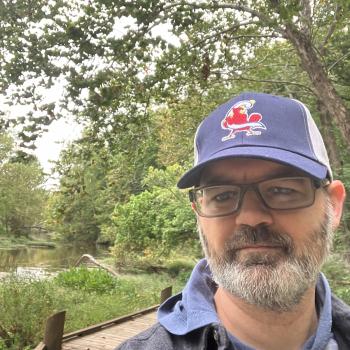How then should we pray? Let’s remember our collective focus in this season of the Christian calendar. In the first 21 days of the year, and during the Lenten season, we see a renewed focus on prayer and fasting. In effect, we once again join with Christian brothers and sisters worldwide in these time honored seasons and practices. Here are some Trinitarian prayers that are in line with our beliefs on the Godhead.
I had the honor of dialoguing with Father Jarvis about prayer and fasting in the Lent seasons, with specific questions about how Protestants can engage in this time.
To read Father Jarvis: On Lent and Fasting, or to watch the vlog: CLICK HERE
For a blog on my writing commitments during Lent: CLICK HERE
i. Father
It goes without saying that the Lord’s Prayer has been prayed by Christians throughout the ages. No matter the faith affiliation, to know and to be able to pray this prayer is like adding an essential brick as we build ourselves up in the Lord.
Some pray this at every worship service. Others pray this prayer every day, or multiple times throughout the day. Some use the actual phrases within the prayer itself as an outline for praying, and for building up to praying one hour.
There are two forms of the prayer, found in Matthew 6 and Luke 11.
I want to focus on Matthew 6. Rev. Arlie Willis, my mom’s dad, mentored me as a young adult and as a young minister who was in the process of discerning. He taught me to memorize and pray the prayer daily and thoughtfully. Then I was to pay attention to anything from the prayer that caught my attention. I was to contemplate that phrase in prayer, to see if the Father would allow me to understand anything further.
From time to time, Grandpa Willis would ask me about my practice of praying the Lord’s Prayer, and about my reactions to it. One time we were dialoguing about various views on forgiveness.
He said something I’ll never forget, and something I’ve never been able to prove wrong Theologically.
“Jared, if you would focus as much on forgiving others as you do on receiving forgiveness, you wouldn’t have to focus on receiving forgiveness.”
He taught me that forgiveness is more like a cycle than an event, contingent on how well I forgive others. He also added some teaching from the prayer itself. You see, forgiveness is the only part of the Lord’s Prayer that our Lord actually offers a direct commentary on.
“For if you forgive men their trespasses, your heavenly Father will also forgive you. But if you do not forgive men their trespasses, neither will your Father forgive your trespasses.” – Matthew 6.14-15
ii. Son
There are plenty of prayers to Jesus, as the Son of God. There are stories in the Gospels of quick prayers. We might call them arrow prayers. We offer arrow prayers in a moment, as needed, in various circumstances.
We see this type of prayer offered by blind men in the Gospel (Matthew 9.27; 20.30; Mark 10.47; 18.38). The blind men in Mark pray specifically:
“Jesus, Son of David, have mercy on me!”
Perhaps it is from this arrow prayer in Scripture that the very early church develops the Hesychasm, a prayer that has now become a blessing to the worldwide church.
“Lord Jesus Christ, Son of God, have mercy on me.”
The basic teaching is that this prayer has a Trinitarian focus.
First of all the phrase Lord Jesus Christ cannot be uttered without the assistance of the Holy Spirit, for no one can say that Jesus is Lord unless the Spirit is with him (1 Corinthians 12.3). So the Holy Spirit is the very atmosphere through whom we utter this prayer.
Secondly, Jesus is the Son of God, and God is the primary way that the Father is identified in Trinitarian Passages in the New Testament.
The prayer is taught as a penitential prayer.
The Hesychasm is often used for a penitent, with an added phrase, i.e. “. . . have mercy on me, a sinner.” However, I find it difficult Theologically to continue to identify as a sinner, to identify with a life that once was, when I have been regenerated.
I have no problem with the humility of the penitent, but I personally refuse to self-identify with a life that has already been crucified.
The prayer is also a meditative or contemplative prayer.
From the early East, from then until now, we see an acceptance of the ambiguity of the awe, wonder, and mystery of God. Do we have to rationally define everything, including our Theology, as Western civilization has demanded?
So the focus of the prayer may or may not be on defining the prayer itself. The focus of the prayer could be on the precipitating events that led us to pray the prayer as an arrow prayer. The focus could also be on what the Spirit brings to mind during and after we have prayed such a prayer.
Do not be afraid of repetition.
In repetition, we may find an answer as to why we are being led to call upon Jesus Christ in this way. The blind men in the Gospels are not afraid to repeat their prayers. In fact, repetition is the basis of Hebrew Biblical meditation.
iii. Holy Spirit
As a Pentecostal in the Wesleyan-Arminian stream, I would say that you can pray to the Holy Spirit any time, and that you can pick any time to pray in your prayer language. However, even with my free-will Pentecostal background, I have discovered over the years that without some sort of regular practice and form, our prayers can become more strenuous than the Spirit would deem necessary.
Some find that the mornings are the best time for them to pray. There are many Scriptures, especially in the Psalms that speak of seeking God in the mornings.
Perhaps the intent is for us to find that time when we can offer our best to Christ in prayer. For me, that is generally after a good brewed cup of coffee or hot tea. I generally prefer to brew with a French Press, but there are other methods that are strong, like a brew called cowboy coffee, or a pour over. Without a paper filter, the froth of the coffee is visible because the oils are not filtered out. So if you brew that way, it may be more tasty because of the oils, but you may want to watch your cholesterol.
I have a 10 to 10 rule with my wife Crystal.
Don’t tell me anything that you want me to remember before 10 am or after 10 pm. Some people just aren’t morning people.
Give God the best part of your day, that you can afford to give Him. If you do so, I think the Psalmist would be proud of you.
This is a prayer to the Holy Spirit that I pray often in the mornings before facing the day.
There are other form prayers to the Holy Spirit. This is a concise version, with a free web version as well.
A Prayer to the Holy Spirit: CLICK HERE
As stated last week, I often pray the prayer of St. Patrick’s Breastplate, a prayer that I believe is a powerful tool for any Pentecostal to utilize. I explain the prayer in my article In Dialogue | Ian & Rachel Carroll.
To read the article or listen watch the vlog: CLICK HERE













